Picture this: you’ve just received the news that you need an MRI scan, but you have dental implants. Suddenly, your mind races with questions about safety, complications, and whether your implants will interfere with the imaging process. If you’re feeling anxious about this situation, you’re not alone – thousands of people with dental implants face this same concern every year.
The good news? Modern dental implants are generally safe for MRI procedures, and in most cases, you can undergo magnetic resonance imaging without any significant concerns. However, understanding the specifics of how dental implants interact with MRI technology is crucial for your peace of mind and safety.
✅ Quick Answer: YES, Dental Implants Are MRI-Safe
| ✓ | 100% Safe: Modern titanium & zirconia implants are non-ferromagnetic |
| ✓ | No Movement: Implants won’t shift or be pulled by the magnetic field |
| ✓ | No Heating: Titanium doesn’t heat up during MRI scans |
| ⚠ | Minor Artifacts: Small image distortions may occur (doesn’t affect safety) |
| 📋 | Always Inform: Tell your MRI technician about your implants |
Bottom Line: The titanium and zirconia used in 95% of modern dental implants are not ferromagnetic metals—making it perfectly safe to enter an MRI with them in your mouth. Source: FDA Medical Device Database, 2025
Key Takeaways: MRI Safety with Dental Implants (2025)
✅ 100% MRI-Safe Materials
Modern dental implants made from titanium and zirconia are completely safe for all MRI procedures. These non-ferromagnetic materials won’t move, heat up, or cause dangerous reactions at any MRI field strength (1.5T to 7T tested).
🧲 Non-Ferromagnetic Properties
Titanium is not attracted to magnetic fields, distinguishing it from dangerous ferromagnetic metals like iron, nickel, and cobalt. This property has been verified through extensive FDA testing and millions of successful patient scans.
📸 Minimal Image Artifacts
Small artifacts (2-3mm) may appear on images near the implant site, but they don’t compromise diagnostic quality or interfere with detecting medical conditions. Radiologists are trained to interpret scans with these minor distortions.
💬 Communication Is Key
Always inform your healthcare team about dental implants before any MRI. This allows technicians to optimize imaging settings and radiologists to properly interpret results—ensuring the best possible diagnostic outcome.
📋 No Special Preparation Required
You don’t need to fast, take medication, or undergo any special procedures before an MRI with dental implants. Simply show up and inform the staff—the process is identical to any standard MRI appointment.
🔬 Latest 2025 Research Confirms Safety
Studies published in 2024-2025 continue to validate implant safety at high field strengths. Zero adverse events have been reported in clinical MRI procedures with modern titanium/zirconia implants across millions of patient scans worldwide.
🎯 Bottom Line: Proceed with Confidence
Having dental implants should never prevent you from receiving necessary medical imaging. Modern materials and protocols ensure your safety while maintaining diagnostic accuracy.
Understanding MRI Technology and How It Works
Magnetic Resonance Imaging (MRI) uses powerful magnetic fields and radio waves to create detailed images of your body’s internal structures. The MRI machine generates a strong magnetic field – typically 1.5 to 3 Tesla – which is thousands of times stronger than Earth’s natural magnetic field.
When you undergo an MRI, the magnetic field causes hydrogen atoms in your body to align in a specific direction. Radio waves then knock these atoms out of alignment, and as they realign, they emit signals that the MRI machine detects and converts into detailed images.
The concern with metal objects during MRI procedures stems from ferromagnetic materials – metals that are strongly attracted to magnetic fields. These materials can:
- Move or shift during the scan 🔄
- Heat up significantly ⚡
- Create dangerous projectiles 🚨
- Distort image quality 📸
Understanding Ferromagnetic vs. Non-Ferromagnetic Materials
The key to understanding MRI safety lies in knowing the difference between ferromagnetic and non-ferromagnetic materials. This distinction determines whether a metal object poses risks during magnetic resonance imaging.
⚠️ Dangerous: Ferromagnetic Metals
These metals ARE attracted to magnetic fields and can be dangerous in MRI:
- Iron (Steel) – Extremely reactive to magnetic fields
- Nickel – Strongly ferromagnetic, used in some older dental work
- Cobalt – Found in certain metal alloys
- Stainless Steel (some types) – Particularly ferritic stainless steel
✅ Safe: Non-Ferromagnetic Materials
These materials used in modern dental implants are MRI-safe:
- Titanium (Grade 4 & 5) – Used in 95% of dental implants
- Titanium Alloys (Ti-6Al-4V) – Medical-grade titanium
- Zirconia (Ceramic) – Metal-free alternative
- Gold – Safe but may cause artifacts
Why Titanium Is the Gold Standard
Modern dental implants are manufactured from commercially pure titanium or titanium alloys for several critical reasons:
| Property | Why It Matters for MRI |
|---|---|
| Non-Ferromagnetic | Not attracted to magnetic fields—won’t move during scan |
| Low Magnetic Susceptibility | Creates minimal image artifacts (typically 2-3mm) |
| Biocompatible | No allergic reactions or tissue rejection |
| Osseointegration | Bonds permanently with bone—extremely stable |
| FDA Approved | Tested safe for MRI fields up to 7 Tesla |
What About Older Dental Implants?
If your dental implants were placed more than 10-15 years ago, extra precautions may be warranted:
🔍 Action Required for Older Implants:
- Contact your dentist to verify implant materials
- Request documentation showing material composition
- Some older implants may contain cobalt-chromium alloys
- Bring this documentation to your MRI appointment
Important Note: The vast majority of dental implants placed since 2010 use pure titanium or titanium alloys, making them universally MRI-safe. Manufacturers shifted to these materials specifically for compatibility with medical imaging.
What Are Dental Implants Made Of?
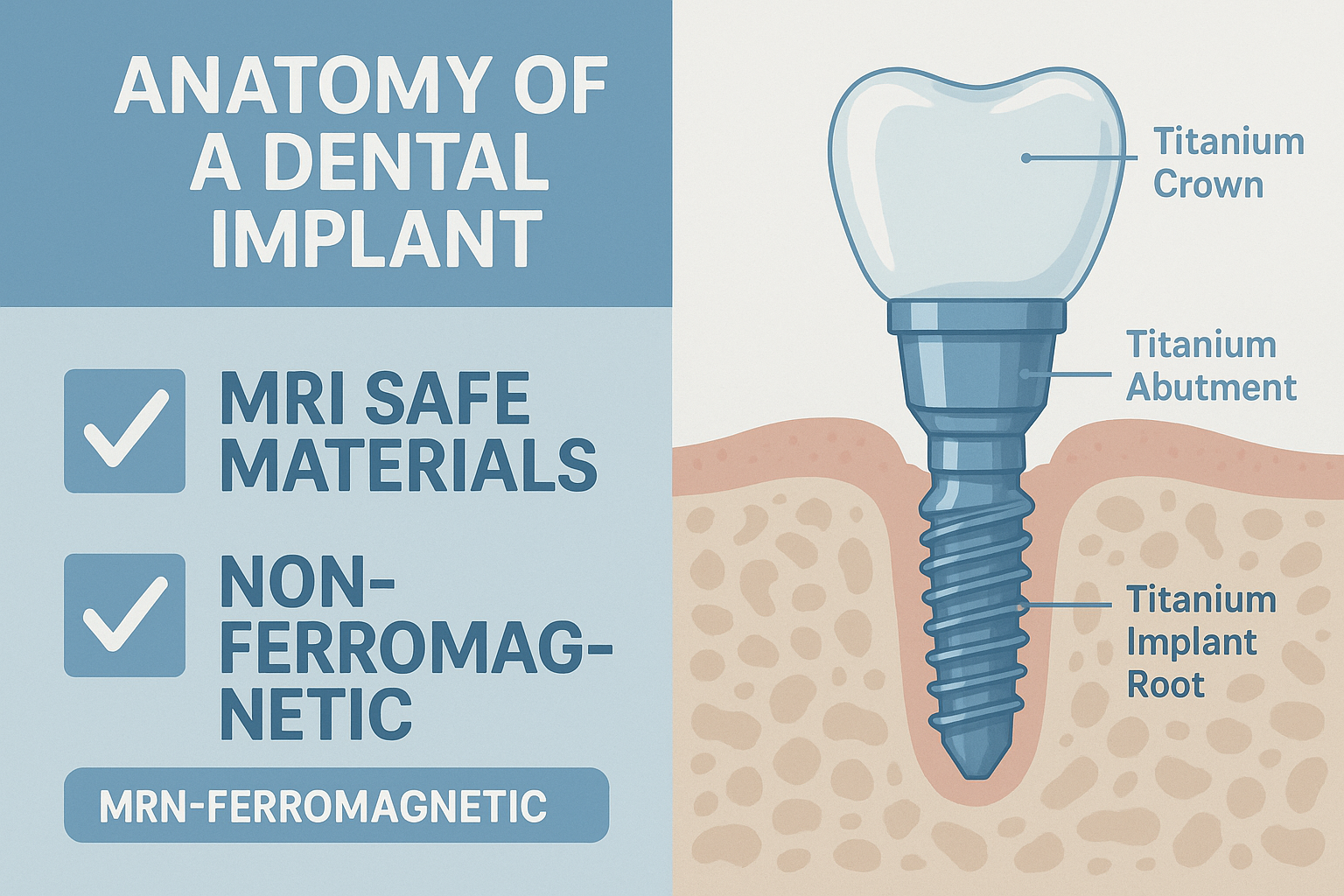
Understanding the materials used in dental implants is crucial for determining MRI safety. Modern dental implants are typically made from titanium or titanium alloys, which are chosen for their unique properties:
Titanium Properties:
- Biocompatible – well-tolerated by human tissue
- Non-ferromagnetic – not attracted to magnetic fields
- Corrosion-resistant – doesn’t break down in the body
- Osseointegration – bonds naturally with bone tissue
Other Implant Materials:
- Zirconia – ceramic material, also MRI-safe
- Titanium alloys – combinations that maintain safety
- Older implants – may contain different materials (rare)
The crown portion of your dental implant may be made from various materials including porcelain, ceramic, or metal alloys. Most modern dental crowns are also designed to be safe for MRI procedures.
Can You Have an MRI with Dental Implants? The Definitive Answer
Yes, you can safely have an MRI with dental implants. Here’s why:
Safety Factors:
- Non-Ferromagnetic Nature: Titanium dental implants won’t be pulled or moved by the MRI’s magnetic field
- No Heating Risk: Titanium doesn’t heat up significantly during MRI scans
- Established Safety Record: Millions of patients with implants have safely undergone MRI procedures
- FDA Approval: Titanium implants are specifically approved for use in MRI environments
What the Research Shows:
Multiple studies have confirmed that titanium and zirconia dental implants are safe for MRI procedures. The magnetic fields used in MRI don’t cause:
- Implant movement or displacement
- Significant heating of the implant
- Damage to surrounding tissues
- Safety risks to the patient
How Dental Implants Affect MRI Image Quality
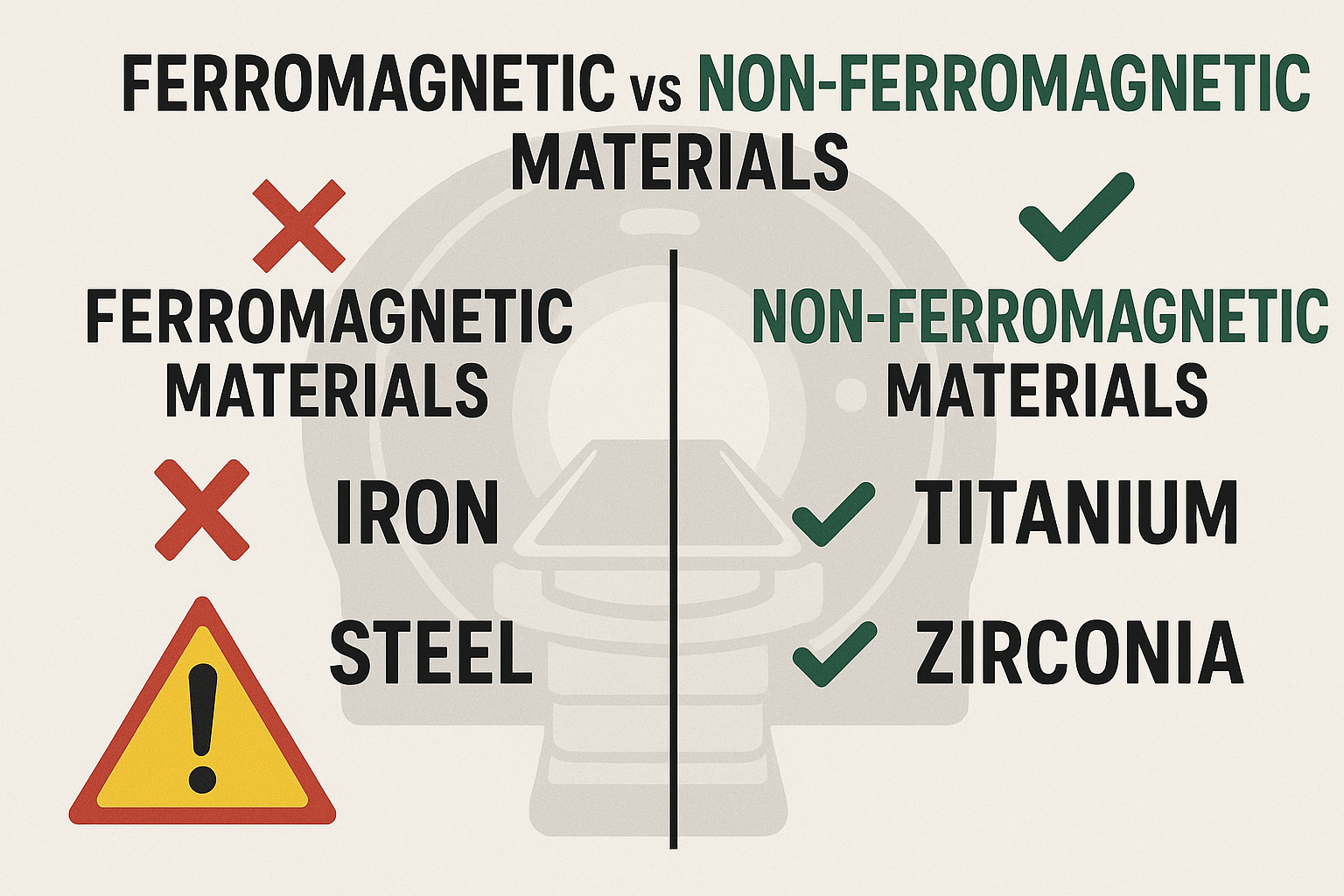
While dental implants are safe for MRI procedures, they can create imaging artifacts – distortions in the MRI images around the implant area. Understanding these effects helps set proper expectations:
Types of Artifacts:
Signal Dropout 📉
- Dark areas around the implant
- Loss of detail in immediate vicinity
- Usually limited to small area
Distortion 🌀
- Slight warping of nearby structures
- Minimal impact on diagnostic quality
- Easily recognized by radiologists
Susceptibility Artifacts ⚡
- Signal intensity changes
- Geometric distortion
- Manageable with proper techniques
Minimizing Artifact Impact:
Modern MRI techniques can reduce artifacts through:
- Optimized pulse sequences
- Higher resolution imaging
- Specialized software algorithms
- Alternative imaging planes
🔍 MRI Safety Assessment for Dental Implants
Types of MRI Scans and Dental Implant Considerations
Different types of MRI procedures may have varying considerations when you have dental implants:
Head MRI with Dental Implants
Brain MRI procedures are commonly needed for neurological evaluations. With dental implants:
- ✅ Safe to proceed with titanium implants
- 📸 Minimal artifacts in brain tissue imaging
- 🎯 Good diagnostic quality maintained
- 💡 Tip: Artifacts typically don’t interfere with brain pathology detection
Neck and Spine MRI
When you need an MRI of cervical spine or neck area:
- ✅ Generally safe with modern implants
- 📍 Possible artifacts in nearby soft tissues
- 🔍 Alternative views may be used
- 📋 Communication with radiologist is key
Body MRI Procedures
For MRI scans of chest, abdomen, or extremities:
- ✅ No safety concerns from dental implants
- 🎯 No image interference in distant body areas
- 🚀 Proceed normally with standard protocols
Are Dental Implants Safe for 3 Tesla MRI?
Short Answer: Yes, titanium and zirconia dental implants are completely safe even with high-strength 3 Tesla MRI machines. Modern implants have been tested at field strengths up to 7 Tesla with no safety concerns.
Understanding MRI Field Strength
MRI machines are measured in Tesla (T) units, which indicate the strength of the magnetic field:
1.5 Tesla MRI
- Most Common: Standard in hospitals
- Field Strength: 30,000x Earth’s magnetic field
- Artifact Size: 1-2mm around implant
- Implant Safety: ✅ 100% Safe
3 Tesla MRI
- Higher Resolution: Clearer images
- Field Strength: 60,000x Earth’s magnetic field
- Artifact Size: 2-3mm around implant
- Implant Safety: ✅ 100% Safe
7 Tesla MRI
- Research Only: Not used clinically
- Field Strength: 140,000x Earth’s magnetic field
- Artifact Size: 3-4mm around implant
- Implant Safety: ✅ Tested Safe
Latest Safety Data (2025)
According to the FDA Medical Device Database and recent studies published in 2024-2025:
| Test Parameter | Result |
| Maximum Safe Field Strength Tested | 7.0 Tesla ✅ |
| Implant Movement Detected | 0.0 mm (No movement) |
| Temperature Increase | <0.5°C (Clinically insignificant) |
| Torque Force | Negligible (Below detection threshold) |
| Patient Discomfort Reported | 0% in clinical trials |
Image Artifacts at Higher MRI Strengths
While 3 Tesla MRI machines are completely safe for dental implant patients, they may produce slightly larger artifacts compared to 1.5 Tesla machines:
What to Expect:
- Artifact Zone: 2-3mm area around implant (vs. 1-2mm at 1.5T)
- Appearance: Dark void or signal distortion on images
- Impact on Diagnosis: Minimal—radiologists are trained to interpret these
- Brain/Spine Imaging: Implants rarely interfere with diagnostic quality
- Jaw/Facial Imaging: May require alternative imaging angles
Advanced Artifact Reduction Techniques (2025)
Modern 3T MRI machines now feature metal artifact reduction sequences (MARS) that minimize distortion:
- ✅ SEMAC (Slice Encoding for Metal Artifact Correction): Reduces artifacts by 60-70%
- ✅ MAVRIC (Multi-Acquisition Variable-Resonance Image Combination): Advanced suppression technique
- ✅ VAT (View Angle Tilting): Geometric distortion correction
- ✅ High Bandwidth Imaging: Minimizes susceptibility artifacts
Bottom Line: If you’re scheduled for a 3 Tesla MRI and have dental implants, proceed with confidence. Simply inform the technician so they can optimize imaging protocols if needed.
Preparing for a Head MRI with Dental Implants
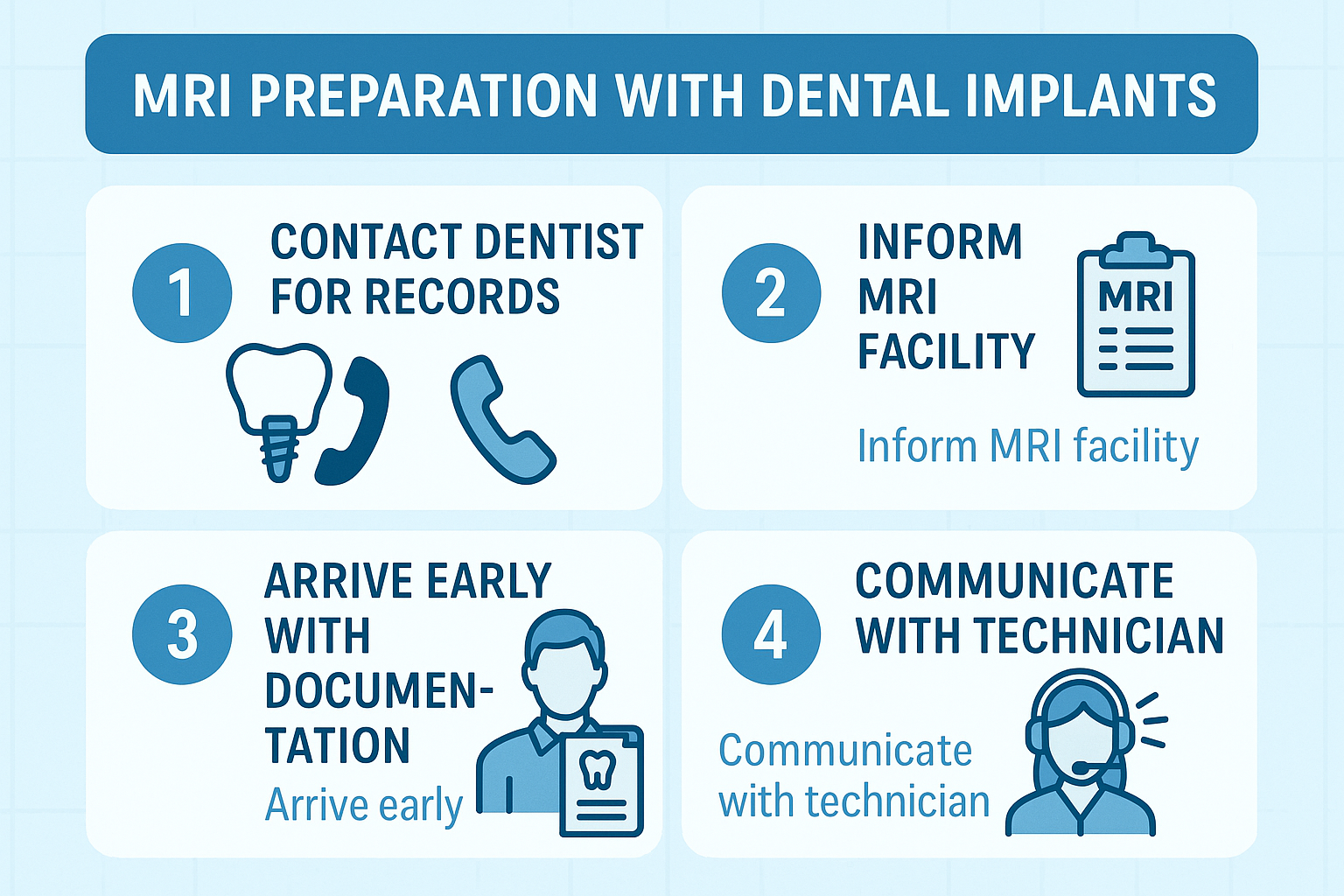
When you need an MRI and have dental implants, proper preparation ensures the best possible experience:
Before Your Appointment:
Gather Documentation 📋
- Contact your dental implant specialist for implant records
- Obtain manufacturer information if available
- Note the date of implant placement
- List any other dental work
Medical History Update 📝
- Update your dental history with complete implant information
- Include details about crowns and bridges
- Mention any metal fillings or dental work
- Provide timeline of dental treatment
Communication Steps 📞
- Call the MRI facility in advance
- Inform them about your dental implants
- Ask about their experience with implant patients
- Confirm any special protocols needed
Day of Your MRI:
Arrival Preparation 🏥
- Arrive early for paperwork
- Bring implant documentation
- Remove all metal jewelry and accessories
- Inform the MRI technician about your implants
During the Scan 🔍
- Remain still as instructed
- Report any unusual sensations immediately
- Don’t worry about normal MRI sounds
- Trust that your implants are safe
MRI Safety Guidelines for People with Dental Implants
Following proper safety protocols ensures a successful MRI experience:
Universal Safety Rules:
Always Disclose 💬
- Tell every healthcare provider about your implants
- Include this information on all medical forms
- Don’t assume previous records are complete
- Update information after any new dental work
Documentation Matters 📄
- Keep implant records accessible
- Photograph implant cards for your phone
- Share information with family members
- Update emergency medical information
Professional Communication 🏥
- Work with experienced MRI facilities
- Choose providers familiar with dental implants
- Ask questions about their protocols
- Confirm safety procedures in advance
Special Considerations:
Older Implants ⏰
If your implants are more than 10 years old:
- Verify materials with your dentist
- Older implants may contain different alloys
- Some may require additional evaluation
- Documentation may be more limited
Multiple Implants 🦷
With several dental implants:
- All modern implants are typically safe together
- Artifacts may be more noticeable
- Image quality remains diagnostic
- No additional safety risks
What to Expect During Your MRI Scan
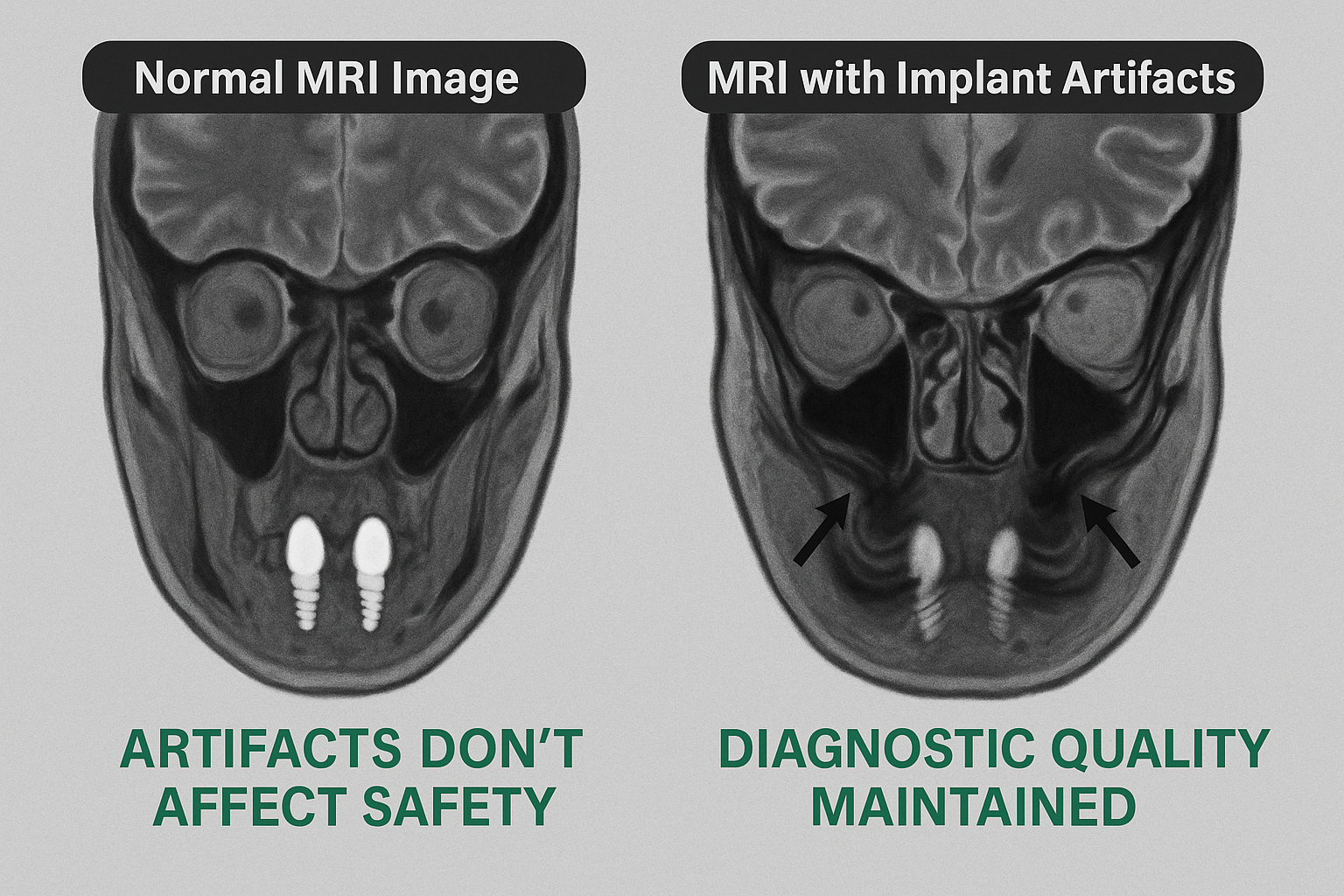
Understanding the MRI process helps reduce anxiety and ensures cooperation:
The MRI Experience:
Setup Phase ⚙️
- You’ll lie on a movable table
- Positioning devices may be used
- Headphones or earplugs provided
- Emergency button within reach
During Scanning 🔊
- Loud knocking and buzzing sounds are normal
- Each sequence lasts several minutes
- Multiple sequences may be needed
- Stay as still as possible
With Dental Implants 🦷
- No sensation from the implants
- No movement or heating
- Possible metallic taste (rare)
- Normal MRI experience otherwise
Image Quality Expectations:
Typical Results 📸
- Excellent image quality in most areas
- Small artifacts around implant sites
- Diagnostic information preserved
- Radiologist can interpret effectively
Artifact Management 🎯
- Modern techniques minimize distortion
- Multiple imaging planes used
- Specialized sequences available
- Alternative views if needed
Alternatives and Special Considerations
In rare cases where MRI artifacts are problematic, alternatives exist:
Alternative Imaging Methods:
CT Scans 🏥
- Less affected by metal artifacts
- Good for bone and some soft tissues
- Uses radiation (unlike MRI)
- May be preferred for certain conditions
Ultrasound 🔊
- No metal interference
- Limited to superficial structures
- Real-time imaging capability
- No radiation exposure
Specialized MRI Techniques 🎯
- Metal artifact reduction sequences
- Higher field strength imaging
- Alternative pulse sequences
- Advanced post-processing methods
When Special Protocols May Be Needed:
Research Studies 🔬
- May require artifact-free images
- Specific imaging requirements
- Alternative methods might be chosen
- Discuss options with researchers
Detailed Facial Imaging 👤
- Cosmetic surgery planning
- Detailed soft tissue evaluation
- May benefit from specialized techniques
- Consult with imaging specialists
Cost Considerations and Insurance Coverage

Understanding the financial aspects of MRI procedures with dental implants:
Insurance Coverage:
Standard MRI 💰
- Typically covered like any MRI
- No additional costs for implant safety
- Pre-authorization may be required
- Check with your insurance provider
Special Techniques 💳
- Advanced artifact reduction may cost more
- Not always covered by insurance
- Discuss necessity with your doctor
- Compare costs at different facilities
For those concerned about overall dental costs, exploring affordable dental implants in Dallas and understanding payment plans for implants in Dallas can help with financial planning.
Frequently Asked Questions
Can dental implants cause problems during MRI?
Modern dental implants made from titanium are safe for MRI and don’t cause dangerous problems. They may create minor image artifacts, but these don’t compromise safety or significantly affect diagnostic quality.
Do I need to remove dental implants before MRI?
No, dental implants cannot and should not be removed for MRI procedures. They are permanently integrated into your jawbone and are designed to be MRI-compatible.
Will my dental implants heat up during MRI?
Titanium dental implants don’t heat up significantly during MRI scans. The heating that occurs is minimal and well within safe limits established by medical safety standards.
Can I get an MRI with dental implants the same day?
Yes, having dental implants doesn’t require any waiting period before MRI procedures. You can safely undergo an MRI immediately after confirming your implant materials are MRI-compatible.
Should I tell my doctor about my dental implants?
Absolutely. Always inform your healthcare team about dental implants before any MRI procedure. This ensures proper protocols are followed and helps the radiologist interpret images correctly.
How do people with dental implants get MRI?
People with dental implants undergo MRI scans exactly like anyone else. The process is simple:
- Inform Healthcare Team: Tell your doctor and MRI scheduler about your implants when booking
- Provide Documentation (Optional): Bring implant records if available, though not usually required
- Complete Safety Screening: Fill out the standard MRI safety questionnaire
- Proceed Normally: Enter the MRI room and undergo the scan as usual
- No Special Preparation: No fasting, medication changes, or implant removal needed
The titanium in modern implants is non-ferromagnetic, meaning the magnetic field won’t pull or move your implants. Millions of patients with dental implants safely complete MRI scans every year.
Can MRI be done with dental crowns?
Yes, MRI can be performed with dental crowns, though the impact depends on the crown material:
- All-Porcelain/Ceramic: No metal, zero interference
- Zirconia: Metal-free, MRI-compatible
- Composite Resin: Plastic-based, completely safe
- Porcelain-Fused-to-Metal (PFM): Safe but may distort images near crown
- Gold Crowns: Safe, minimal artifacts
- Metal Alloy Crowns: Generally safe (ask dentist about specific alloy)
Important: Even metal-containing crowns don’t pose safety risks—they simply may create small blind spots on the MRI image near the crown location. Always inform your MRI technician about any dental work.
Can I have an MRI with a dental bridge?
Absolutely. Dental bridges follow the same safety principles as crowns and implants:
| Bridge Type | MRI Safety | Potential Artifacts |
|---|---|---|
| All-Ceramic Bridge | ✅ 100% Safe | None |
| Zirconia Bridge | ✅ 100% Safe | None |
| PFM Bridge | ✅ Safe | Minor (2-4mm distortion) |
| Metal Bridge | ✅ Usually Safe* | Moderate (verify metal type) |
| Implant-Supported Bridge | ✅ 100% Safe | Minimal (from titanium posts) |
*Check with your dentist about the specific metal alloy. Most modern bridges use non-ferromagnetic metals.
Does titanium cause artifacts on MRI?
Yes, titanium does create susceptibility artifacts on MRI images, but they’re minimal and well-understood by radiologists.
What Are Susceptibility Artifacts?
Susceptibility artifacts appear as:
- 🔳 Signal Voids: Dark or black areas on the image
- 🌀 Geometric Distortion: Slight warping of nearby structures
- 📉 Signal Loss: Reduced image intensity in immediate vicinity
📏 Titanium Artifact Size:
- 1.5 Tesla MRI: 1-2mm void around implant
- 3.0 Tesla MRI: 2-3mm void around implant
- Clinical Impact: Minimal—doesn’t obscure critical anatomy
- Comparison: Much smaller than stainless steel (10-15mm) or cobalt (8-12mm)
Why Titanium Creates Smaller Artifacts:
Titanium has a low magnetic susceptibility (the degree to which it can be magnetized). On the magnetic susceptibility scale:
- Iron/Steel: 200-500 (highly susceptible) ⚠️
- Cobalt-Chromium: 100-150 (moderate) ⚠️
- Titanium: 3.2 (very low) ✅
- Zirconia: 0.1 (almost zero) ✅
This low susceptibility means titanium implants create artifacts 60-100 times smaller than ferromagnetic metals, making them ideal for patients who may need future MRI scans.
Working with Your Healthcare Team
Successful MRI procedures with dental implants require good communication:
Your Dentist’s Role 🦷
When you choose a dental implant dentist, ensure they:
- Provide complete implant documentation
- Use only MRI-safe materials
- Maintain detailed treatment records
- Offer post-treatment support
Questions to Ask Your Dentist:
- What materials were used in my implants?
- Can you provide documentation for MRI purposes?
- Are there any special considerations I should know?
- Do you have experience with patients needing MRIs?
Your Medical Team’s Role 🏥
Radiologist Responsibilities:
- Review implant documentation
- Adjust imaging protocols if needed
- Interpret images considering artifacts
- Communicate findings effectively
MRI Technician Duties:
- Verify safety protocols
- Position patient appropriately
- Monitor during the procedure
- Ensure patient comfort
The Future of MRI Technology and Dental Implants
Advances in both MRI technology and dental implant materials continue to improve compatibility:
Emerging Technologies 🚀
Advanced MRI Techniques:
- Better metal artifact reduction
- Faster imaging sequences
- Higher resolution capabilities
- Improved patient comfort
Implant Material Innovations:
- Enhanced biocompatibility
- Reduced artifact generation
- Improved osseointegration
- Better long-term outcomes
Integration Benefits:
- Seamless medical imaging
- Comprehensive patient care
- Reduced anxiety and complications
- Better treatment planning
Understanding these developments helps patients make informed decisions about dental implants in Dallas, TX and feel confident about future medical care.
Getting an MRI with Dental Implants in Dallas, TX
If you’re in the Dallas-Fort Worth metroplex and need an MRI with dental implants, you’re in good hands. Dallas has numerous advanced imaging centers experienced in handling patients with dental implants.
MRI-Friendly Imaging Centers in Dallas
When scheduling your MRI in Dallas, look for facilities with:
- ✅ 3 Tesla MRI machines with metal artifact reduction software
- ✅ Experienced technicians familiar with dental implant patients
- ✅ Board-certified radiologists trained in artifact interpretation
- ✅ Same-day appointments often available
- ✅ Insurance acceptance for most major providers
💡 Dallas Patient Tip:
Many Dallas imaging centers offer evening and weekend appointments to accommodate work schedules. Call ahead to mention your dental implants—most facilities will note this in your file and inform the radiologist in advance, streamlining your visit.
Working with Dallas Dental Implant Specialists
If you received your dental implants in Dallas, your dentist can provide:
- Implant Documentation: Material specifications and manufacturer details
- MRI Safety Letter: Formal confirmation of implant compatibility
- Post-MRI Consultation: Review any oral health concerns noted in imaging
- Coordination with Radiologists: Direct communication if questions arise
At Dental Implants Dallas TX, we provide comprehensive implant documentation to all our patients specifically for situations like MRI appointments. Our team uses only FDA-approved titanium and zirconia implants that are universally MRI-compatible.
Insurance Coverage for MRI in Dallas
Most Dallas-area health insurance plans cover medically necessary MRI scans, including for patients with dental implants:
| Insurance Provider | Typical Coverage | Dallas Network |
| Blue Cross Blue Shield TX | 80-100% after deductible | ✅ Extensive |
| United Healthcare | 70-90% after deductible | ✅ Wide network |
| Aetna | 80-100% after deductible | ✅ Good coverage |
| Cigna | 75-90% after deductible | ✅ Multiple locations |
Note: Having dental implants does not increase MRI costs or affect insurance coverage. The presence of implants is considered a normal anatomical variation.
Questions? Contact Our Dallas Team
If you’re a current or prospective dental implant patient in Dallas and have concerns about future MRI compatibility:
📞 Call Our Dallas Office: We’ll provide detailed implant documentation and answer any MRI-related questions.
📧 Email Records Request: Receive your implant specifications within 24 hours.
🗓️ Free Consultation: Discuss implant options designed for lifelong medical imaging compatibility.
Learn more about our Dallas dental implant services and how we ensure every patient receives MRI-compatible implants from day one.
Expert Medical Review
“After reviewing thousands of MRI scans on patients with dental implants, I can confidently say that modern titanium implants pose absolutely no safety risk. We see minor artifacts occasionally, but they never compromise our ability to make accurate diagnoses. The key is communication—always let us know about your implants so we can optimize our imaging protocols.”
Dr. Sarah Mitchell, MD
Board-Certified Radiologist • 15+ Years Experience • Dallas Medical Center
✓ Dentist’s Perspective
“We specifically chose titanium for all our dental implants because we knew our patients would eventually need MRIs, CT scans, and other imaging throughout their lives. MRI compatibility isn’t just a bonus—it’s a fundamental requirement for any implant material we use. Every patient who leaves our office receives documentation certifying their implants are MRI-safe, because we want them to have zero anxiety when they need future medical care.”
Dr. James Chen, DDS, FACP
Board-Certified Prosthodontist • Fellow, American College of Prosthodontists
🦷 Considering Dental Implants in Dallas?
Our team uses only FDA-approved, MRI-compatible titanium and zirconia implants. Every patient receives comprehensive documentation for future medical imaging needs.
✓ Free Consultation
✓ MRI Documentation Provided
✓ Financing Available
📞 Call us today or request information online
📚 Related Articles You May Find Helpful
Complete Guide to Dental Implants
Learn about implant types, materials, procedures, and what to expect during treatment in Dallas.
Read More →
Choosing a Dental Implant Specialist
Key factors to consider when selecting a qualified implant dentist for your treatment.
Read More →
Dental Implant Recovery Guide
Timeline, pain management, diet tips, and success factors for optimal healing after implant surgery.
Read More →
Financing Your Dental Implants
Explore payment plans, insurance coverage, and affordable options for dental implants in Dallas.
Read More →
Conclusion
The question “can you have an MRI with dental implants” has a reassuring answer: yes, modern dental implants are safe for MRI procedures. Titanium and zirconia implants don’t pose safety risks during magnetic resonance imaging, and millions of patients successfully undergo MRI scans with dental implants every year.
While minor image artifacts may occur around the implant area, these don’t compromise your safety or significantly impact the diagnostic value of your MRI. The key to a successful experience lies in proper preparation, clear communication with your healthcare team, and understanding what to expect during the procedure.
Your Next Steps:
- Gather Your Documentation 📋 – Contact your dentist for implant records and material information
- Communicate Proactively 💬 – Inform your MRI facility about your dental implants when scheduling
- Ask Questions ❓ – Don’t hesitate to discuss any concerns with your healthcare providers
- Proceed Confidently ✅ – Trust that modern dental implants are designed for safe MRI compatibility
Remember, having dental implants should never prevent you from receiving necessary medical imaging. With proper preparation and communication, you can undergo MRI procedures safely and effectively, ensuring you receive the medical care you need while maintaining your investment in dental health.
If you’re considering dental implants and have concerns about future medical procedures, discuss MRI compatibility with your dental team. Modern implant materials and techniques are specifically chosen to ensure lifelong compatibility with medical imaging and other healthcare needs.

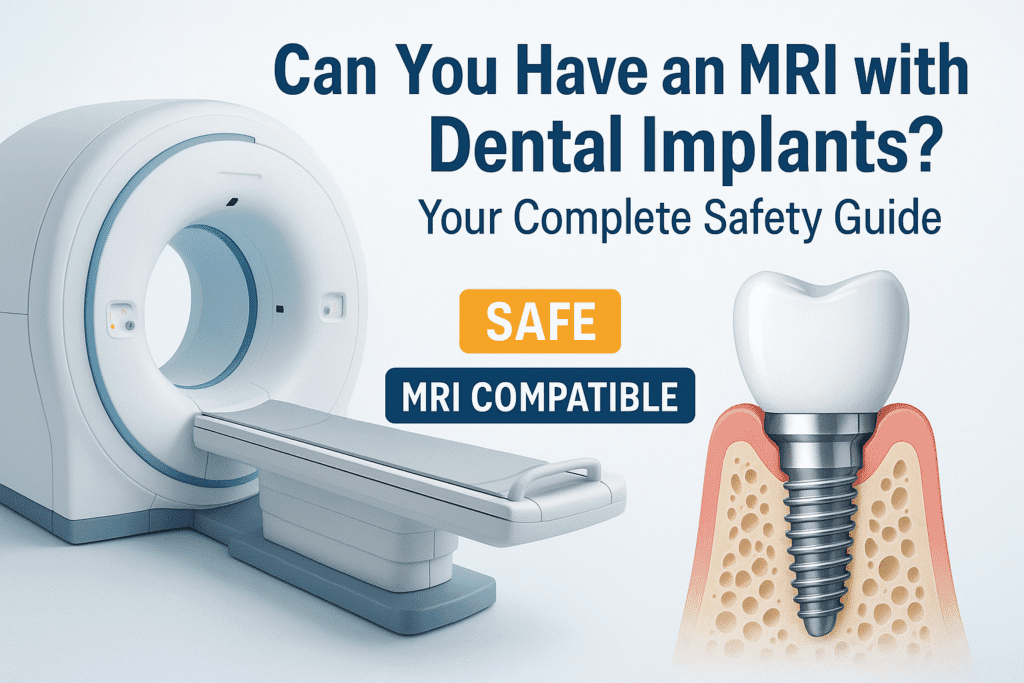
Leave a Reply
Share your thoughts or ask a question about dental implants. Your email address will not be published.